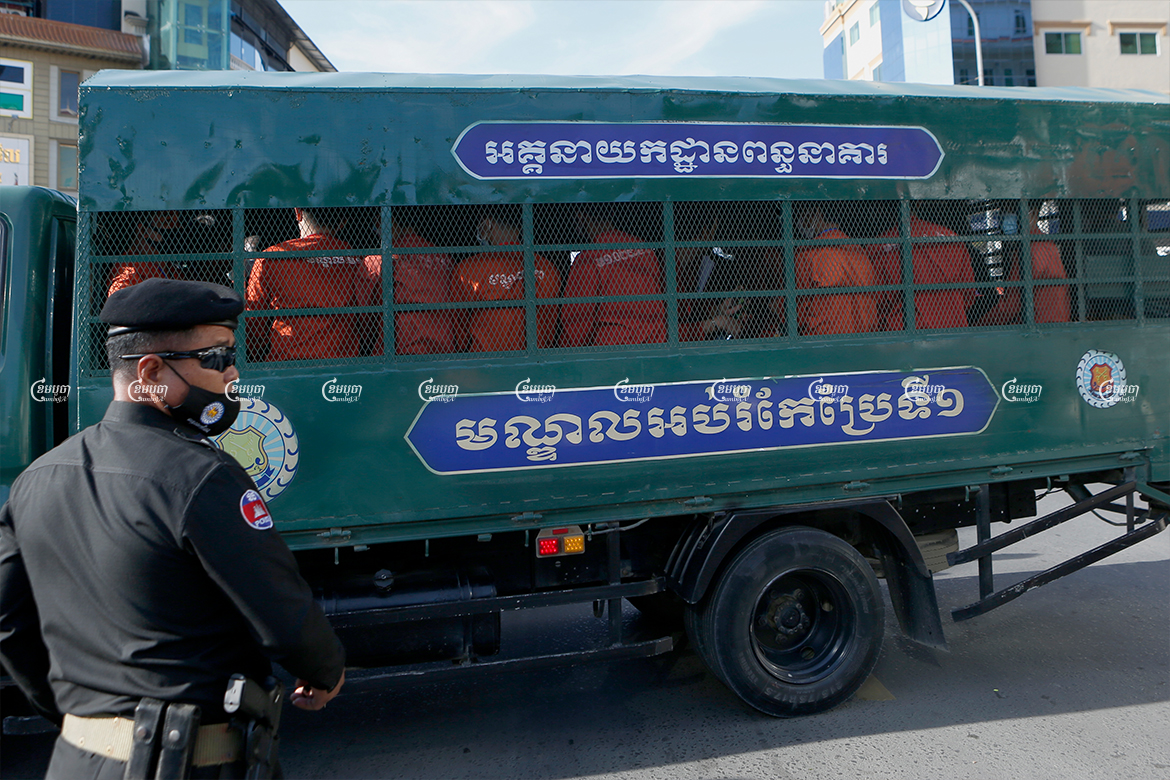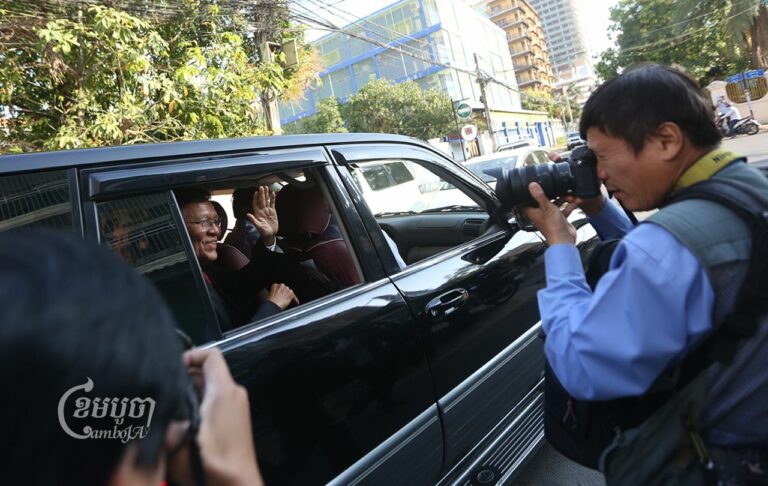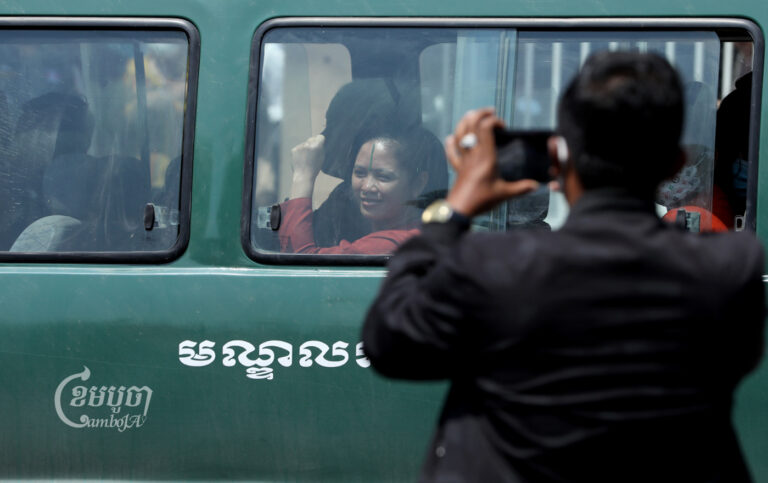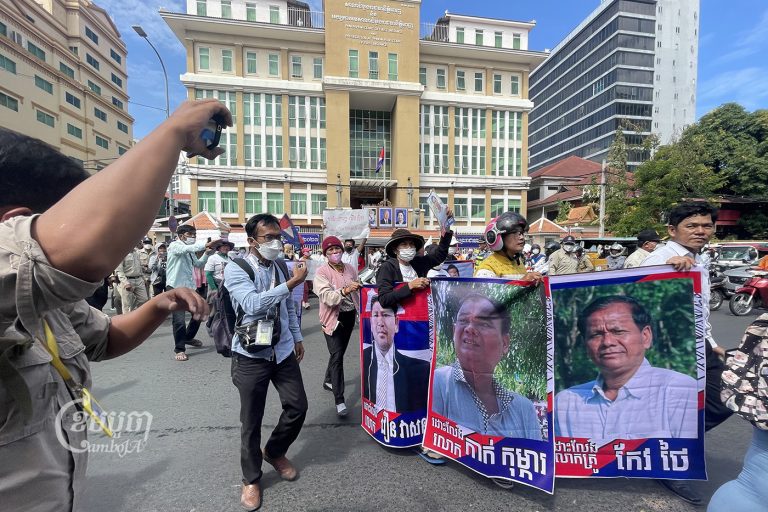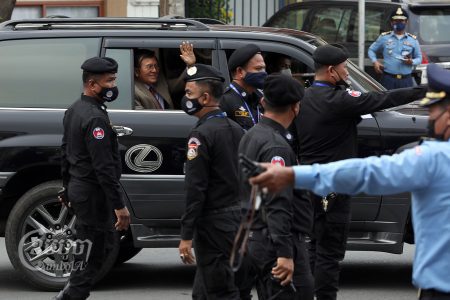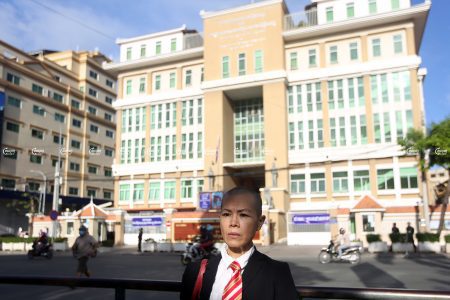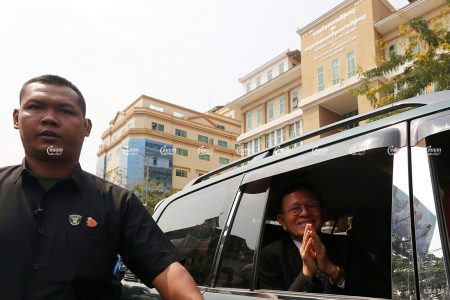The Phnom Penh Municipal Court today resumed the first of a series of trials involving 44 opposition party activists charged with plotting and incitement to cause social chaos in connection to the failed attempt by leading opposition figure Sam Rainsy to return to Cambodia from exile on November 9, 2019. The trials had been delayed for several months due to COVID-19.
Of the six defendants present at the court today, three – Tum Bunthorn, Kak Komphea and Heng Chansothy – were in pre-trial detention. Only two of the activists were questioned this morning.
The trials will be held over seven days on the following Tuesdays, with the next trial set for December 14. The final trial will be held on February 8. There will be no trial held on January 18.
The judges and deputy prosecutor questioned Bunthorn and Phuong Tha on their alleged support for the opposition party after its dissolution, asking them whether they believed it was exercising the right to freedom of expression to continue doing political activity despite a court ban. Deputy prosecutor Seng Hieng questioned the pair over what he described as Rainsy’s attempts to overthrow the government and alleged insults against the king.
Presiding judge Ros Piseth largely questioned the defendants on their activities related to Rainsy’s attempted return to Cambodia on November 9, 2019, asking whether they had shared or received information from party leaders. He also questioned Bunthorn on why the activist had travelled to Malaysia in August 2019, pressing him on who had supported the trip and who he had met there.
Although Bunthorn acknowledged that he had travelled to Malaysia in August 2019, he refused to answer further questions from the prosecutor and presiding judge.
29-year-old Phuong Tha, the former president of the CNRP youth movement in South Korea, maintained that he had not been involved with the opposition party since its dissolution.
“I heard some news from social media about Sam Rainsy’s return, but I have not been involved in anything, and as a normal activist, I also don’t communicate with high CNRP officials,” he said.
He also refused the accusation from the prosecutor.
“This accusation on me is not right,” he insisted. “I just expressed my rights as a normal citizen legally, not committing any incitement.”
Am Sam Ath, deputy director of human rights group Licadho, said that the ongoing trials were receiving close attention from the international community.
“The international community regards this case as politically motivated rather than law enforcement, because all of them are former CNRP activists,” he said. “The judge has the right to ask, but the defendant has the right not to answer – but the defendant can lose their advantage if they still keep silent.”
Soeng Senkaruna, spokesman for human rights group Adhoc, told CamboJA that the case was related to political motivations.
“Using the court system to pressure political opponents is an abuse of political rights,” he said. “It’s usually for people who use a political message opposite from the government that the government always takes action, but for government supporters, it doesn’t take any legal measures. It’s the law enforcement of double standards, as we see.”
He told CamboJA that he believed that political negotiation was a better path forward than the court system.
“Right or wrong depends on the court, but we don’t want to see political conflicts solved by the court system, because it’s affecting the independence of the court,” he said. “Rather, it should be solved by negotiation among those politicians.”

Cambodian-American activist and lawyer Seng Theary, who was one of the six defendants in court today, surprised observers by wearing a traditional outfit associated with the apsara spirits of Cambodian myth. Deputy prosecutor Seng Hieng asked Theary to wear regular clothes on her next court appearance.
“It’s really beautiful to dress in a Cambodian costume like an apsara, but this time and today as a defendant [she] should not dress like this,” he said. “[A defendant] should dress like the others.”
Theary, who will be sentenced on December 28, said that the judge told her that dressing in this manner went against court principles.
“Cambodians who wear foreign costumes can join in the court hearing freely, but I dress in Khmer traditional clothes – why do they ban me from participating? It’s unreasonable,” she said.
She said that the judge will sentence her on December 28, as there will be less public attention over the holidays.
“If they drop the charges or imprison me, no one will pay attention,” she said. “It’s a political theater that they push me to be an actress in. I dress in this costume to represent women and have shaved my hair in condolence to express the hurt and sorrow of the Cambodian people after the brutal killing of [murdered opposition activist] Sin Khon,” she said.
“It’s completely politically motivated that they want to shut up my voice because I have been an advocate of freedom and rights since 1995,” she said.


